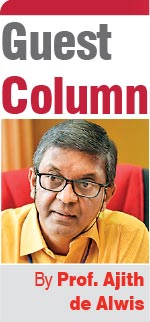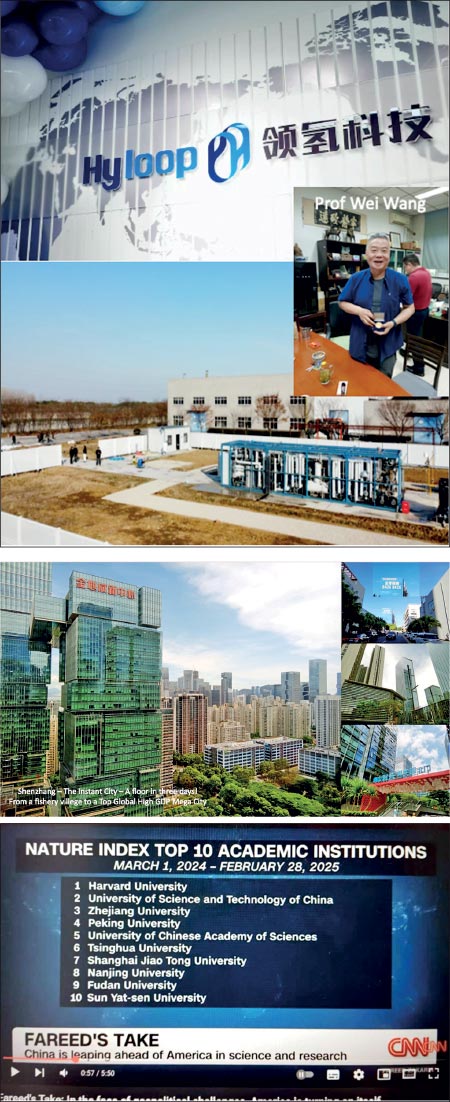Saturday Feb 28, 2026
Saturday Feb 28, 2026
Friday, 27 June 2025 00:00 - - {{hitsCtrl.values.hits}}
 One of the most emotional yet profound books you can read is “Man’s search for meaning” by Viktor Frankl. The story is heartbreaking as it is an unbelievable story of humanity brutalising humanity and surviving amidst it! It clearly articulates the value of having a purpose that is both selfish and selfless in a positive, meaningful way. Reading “Ikigami” by Hector and Francesca later I again found that having a meaningful reason to live is an important life principle. I thought of this topic on the day I listened to students and researchers in China, after understanding the meteoric rise of their economy. A recent CNN news documentary capturing Nature Index research showcased that 9 out of 10 in the top 10 are Chinese universities. Definitely, lessons are there for us.
One of the most emotional yet profound books you can read is “Man’s search for meaning” by Viktor Frankl. The story is heartbreaking as it is an unbelievable story of humanity brutalising humanity and surviving amidst it! It clearly articulates the value of having a purpose that is both selfish and selfless in a positive, meaningful way. Reading “Ikigami” by Hector and Francesca later I again found that having a meaningful reason to live is an important life principle. I thought of this topic on the day I listened to students and researchers in China, after understanding the meteoric rise of their economy. A recent CNN news documentary capturing Nature Index research showcased that 9 out of 10 in the top 10 are Chinese universities. Definitely, lessons are there for us.
I was walking to a meeting at Tsinghua University guided by a research student of RCEES-CAS. That day Tsinghua had an international fair with students from many countries having their own country corner in the sports ground. It was while walking past a basketball court that my guide just opened up and stated the following – a moment of epiphany for me. The state ensures that students have access to sports facilities and spaces for exercise with the expectation that they stay well and energetic. We have to ensure our good health for 40 years plus he said – why to serve!
Expectation of the state
With education and all such facilities, the expectation of the state is for you to serve the country and all in the subsequent 40 years! – he told me seriously and sincerely and I thought there was a personal ikigai in that statement. It was really interesting and touching. I knew I was within the space of a world-class university and soaking in the spirit of a university each moment and this conversation was thought-provoking.
My meeting was with Professor Wei Wang who interestingly has been to Sri Lanka as a consultant to ADB in 1989 to assist in setting up the country’s first landfill which never took off. That latter aspect came out almost at the end of the discussion with him when I saw Ceylon Tea inside his cupboard and commented. He has now converted his gold medal-winning invention in the Geneva of Biogas to negative carbon green hydrogen process to a pilot demonstrating facility in Changzhou, Jiangsu Province in China with their startup Hyloop. Who said startups are by 20-somethings! His youthful enthusiasm over the startup and what they are trying to achieve was exciting – 40 years plus service and still innovating!
Our situation with solid waste I know only too well and thought why? We too freely educate and provide resources yet what we have are more of the ‘Diyaw’ ilk and usually witness mostly the departure of the dispirited. I felt a yearning to have similar moments similar to the above with students and professionals of ours as my 40-plus years of experience had been hearing lots of voices stuck in the selfish grove! Of course, all is not lost I must say in Sri Lanka we do still have some excellent stock!
 Modern miracle story
Modern miracle story
China is a modern miracle story too though a lot less spoken about. Quietly and meticulously the growth trajectory has moved powered by advances in science and technology with indigenous minds over 30 years. I am studying this journey and hope to present analytically the results together with a colleague here. If the purpose was missing, I am sure no journey of this type could have been possible. Results take time and you only have a vision and your mind says – yes this should be done and that is the China story.
Knowledge generation is not easy especially if you are hungry. China’s equation is not simple as we are looking at a 1.4 billion population.
China perhaps is one country that actually worked on one parameter of the I = PAT equation of Ehrlich and Holdren (1972). In this equation, Impact is associated with three parameters – population, affluence, and technology. They had the one-child policy till 2016. With the situation having changed that policy is now not followed. China faced a great famine in the period of 1959-1961. Today food is plenty but with the lessons from the past, I feel the Chinese food industry is almost a circular food economy. The variety is astonishing and similarly the various conversions as dishes.
T is technology and that is a key element of all transformations. Deng Xiaoping who led China’s reforms and the opening up had this to say – For us to realise modernisation, the key is to advance science and technology, which ultimately has to do with education. Universities became key institutes and research with purpose became a key activity in the development of China.
Research is a defining activity
Research thus is actually a defining activity in a university. We excessively spent time and energy on an undergraduate curriculum and a multitude of documents. Then an equally time-consuming audit process is present seeing whether we follow all the documents that we have developed. What does not get served are the national needs. What does not get added are knowledge that fuels growth. Research is simply not generating rupees and a critical amount of research is not taking place. However, the way the set-up is supported by our education is generating dollars but not within the national boundaries.
At Tsinghua when you enter as an undergraduate – it is tough to get in as it is one of the best – you have the opportunity to proceed to a PhD directly. I also noted that some research is not exactly for viewing. Research is coupled well with the economy and security. China, I believe is one country that has followed the wealth generation through knowledge production very well. Of course, this was articulated in the USA and this lesson from the USA had been well understood by the Chinese university system. Chinese universities follow well the intellectual property concepts and technology transfer and the systems present are really a purposeful adaption.
With the state overlooking the economy yet with the free hand to grow the triple helix model of innovation of state-university-industry is the norm and very much the organisational DNA. Companies have specially allocated doctoral and post-doctoral spaces to interact and provide research spaces to university graduates. All companies openly acknowledge the strong links to universities across regions. Vice Chancellors do have their own performance task of ensuring a minimum of 100 job positions to their graduates when the final graduating time arrives.
Close cooperation
As I write this, I note that the adjoining Peking University has announced a research success with Hydrogen energy core technology. The race to transform into a hydrogen economy has been accepted. China drives with five-year plans that have long-term perspectives as well as clear specific short-term action plans. I sense the close cooperation of scientists, and researchers with the state plans and the huge respect that the state extends to the scientific community. My understanding and the lesson taken is one takes on a national issue as the research question and pursues a state-of-the-art solution. No Jugaad-type solution seeking. Such a pursuit adds strength and resilience. We must understand the folly of being happy with substandard solutions and feeling comfortable with managing issues by the day!
I am writing this from Shenzhen. Ezra Vogel of Harvard has stated that no city in the world has ever grown as rapidly as Shenzhen. It is from here that China opened up and Shenzhen is where yiyecheng (built overnight) materialised. Moving around the city dedicated lots named industry parks, science parks, etc., meets the eye quite frequently. Shenzhen was declared as a special economic zone around the same time as our Katunayake becoming a free trade zone – what contrasting trajectories with time. A lesson from Shenzhen is ‘Time is money; efficiency is life’. I heard the Shenzhen rule – adding one story every three days! City builders of the day were driven with purpose. Shenzhen University was an early addition to the city and resources were given even though was difficult. Today there are more than 20 universities and 25 as the aim as this year ends.
It is said that the Chinese have strict expectations on two aspects – medicine and education. The importance of ensuring education and further ensuring that the educated do deliver back to society is a lesson I realised through the conversation with and the visit to Shenzhen and Tsinghua. Thank you Hua Xiuzhi – your comment made this column possible and I believe I captured what you said and did justice.